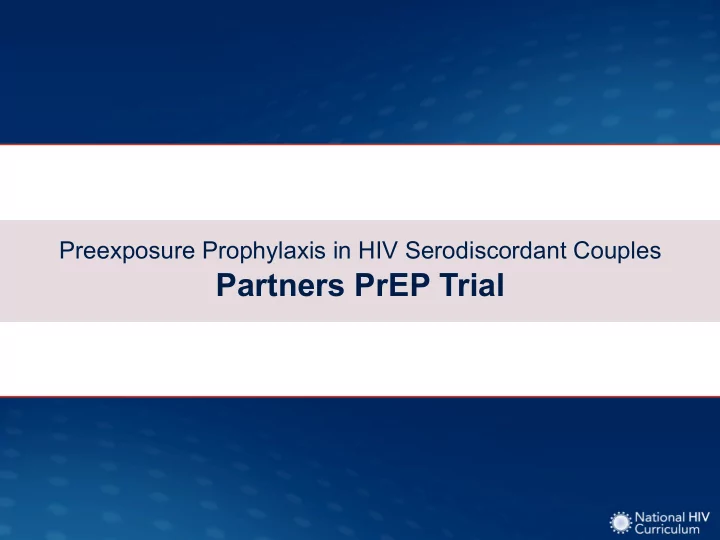

Preexposure Prophylaxis in HIV Serodiscordant Couples Partners PrEP Trial
Oral PrEP for Heterosexual Couples in Kenya and Uganda Partners PrEP: Study Design Study Design: Partners PrEP • Background : Randomized, placebo-controlled trial that examined efficacy and safety of tenofovir DF Placebo and tenofovir DF-emtricitabine as preexposure (n = 1248) prophylaxis in heterosexual HIV-1 serodiscordant couples from Kenya and Uganda • Inclusion Criteria (4758 enrolled) - 18 years of age or older Tenofovir DF - HIV-1-serodiscordant couples (n = 1251) - HIV-seropositive partner: not receiving ART and Did not meet Kenyan or Ugandan guidelines for initiation of ART - HIV-seronegative partners: normal renal function; not infected with HBV; not breastfeeding Tenofovir DF-Emtricitabine (n = 1251) • Treatment Arms: - Placebo: 1 pill daily - Tenofovir DF: 1 pill daily - Tenofovir DF-emtricitabine: 1 pill daily Source: Baeten JM, et al. N Engl J Med. 2012;367:399-410.
Oral PrEP for Heterosexual Couples in Kenya and Uganda Partners PrEP: Study Design 4,758 Heterosexual, HIV-1-Serodiscordant Couples Placebo (n = 1584) + Tenofovir DF + (n = 1584) Tenofovir DF-Emtricitabine (n = 1579) n = 1808 n = 2950 11 total couples found to be ineligible and not included in the intention-to-treat analysis. Source: Baeten JM, et al. N Engl J Med. 2012;367:399-410.
Oral PrEP for Heterosexual Couples in Kenya and Uganda Partners PrEP: Results 80 P < 0.001 Number of HIV-1 Infections P < 0.001 60 52 ⇓ 67% ⇓ 75% 40 17 20 13 0 Placebo Tenofovir DF Tenofovir DF- Emtricitabine Study stopped July 2011 by DSMB because of PrEP efficacy Source: Baeten JM, et al. N Engl J Med. 2012;367:399-410.
Oral PrEP for Heterosexual Couples in Kenya and Uganda Partners PrEP: Conclusions Conclusions : “Oral tenofovir DF and tenofovir DF- emtricitabine both protect against HIV-1 infection in heterosexual men and women.” Source: Baeten JM, et al. N Engl J Med. 2012;367:399-410.
Acknowledgment The National HIV Curriculum is an AIDS Education and Training Center (AETC) Program supported by the Health Resources and Services Administration (HRSA) of the U.S. Department of Health and Human Services (HHS) as part of an award totaling $800,000 with 0% financed with non-governmental sources. This project is led by the University of Washington’s Infectious Diseases Education and Assessment (IDEA) Program. The content in this presentation are those of the author(s) and do not necessarily represent the official views of, nor an endorsement, by HRSA, HHS, or the U.S. Government.
Recommend
More recommend